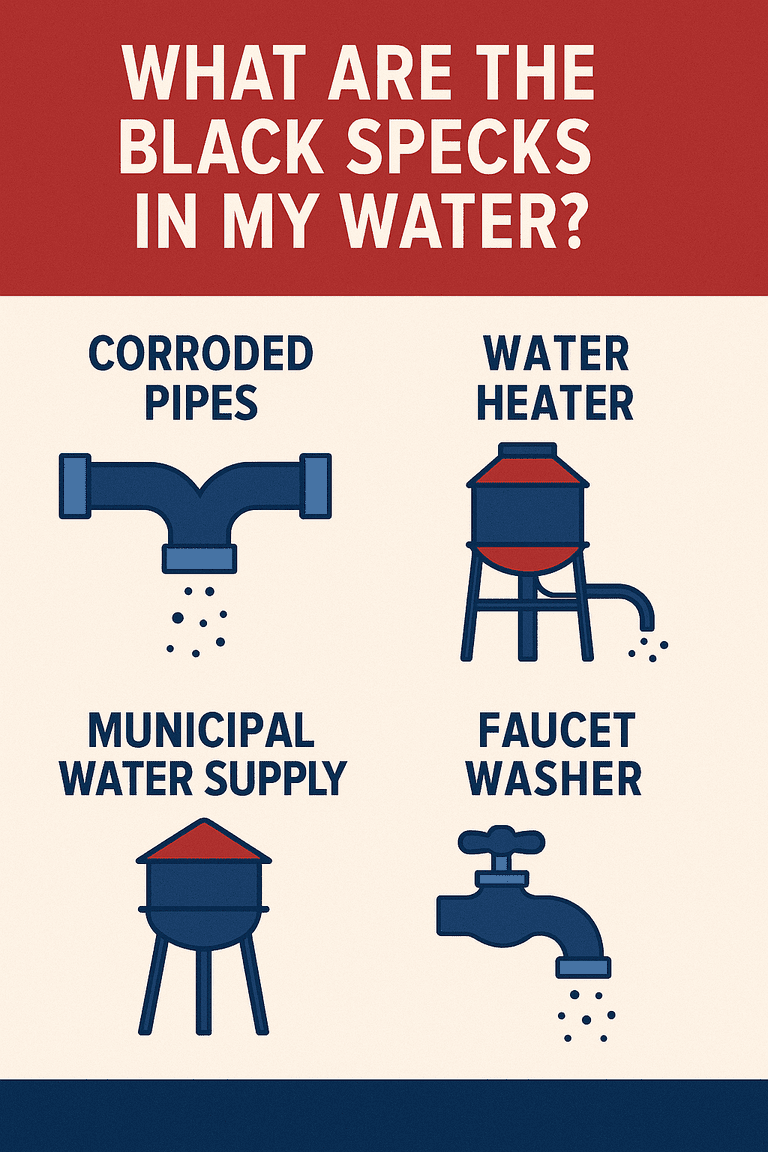What Are the Black Specks in My Water?

MICHAEL VETTAS
Trainer, The Master Trades GroupMichael Vettas brings more than 30 years of experience in the plumbing, HVAC, and electrical trades, along with a deep passion for developing the next generation of skilled technicians.
Learn MoreIf you have black specks in your home’s water, something’s not right—and identifying the source of the problem is essential to fixing it and restoring your home’s supply of clean water.
Here’s a look at the most common sources of black specks from tap water and how to get rid of them.

Top 3 Sources of Black Specks in Water
- Pipe corrosion: Old pipes can begin to corrode after many years of use. When they do, small, irregular pieces of pipe can break off and wind up in your water. Corroded pipes usually end up sending black specks through cold water taps, and these black specks are most apparent when your home’s water has been turned back on by the water company after a shut-off.
- Pieces of corroded water heater: If you see black specks when you turn on your hot water in the tub, shower, or sink, your water heater is likely corroding, or the water lines to and from the water heater are corroded. It’s not uncommon for black specks to remain on the sides of sinks, tubs, and showers after the hot water has been turned off.
- Pieces of broken parts: Are the black specks in your water small and rubbery? These could be disintegrated pieces of a rubber gasket, washer, or flexible supply hose. Rubber can begin to break down after years of use or because of disinfectants used in the city’s water supply.
How Do I Get Rid of Black Specks in My Water?
While black specks in your water can be alarming, the good news is that there’s a lot that can be done to get rid of them—and prevent them from coming back!
Depending on the source of your water’s black specks, cleaning up your water could involve:
- Water heater maintenance service
- Water heater repair or replacement service
- Water line repair or replacement
- Faucet repair or replacement
- Water conditioning system installation
- And other plumbing services
To get first-class solutions to restoring your home’s water and maintaining your plumbing system, contact Len The Plumber Heating & Air. Our expert plumbers are ready to help!
Call 800-950-4619 or contact us online for plumbing service in Maryland, Northern Virginia, Pennsylvania, Delaware, and Washington, D.C.
We proudly offer 24-hour emergency service at no extra charge, as well as flexible financing options and the highest-quality service.
Black Specks in Water FAQ
What do black specks in tap water mean?
Black specks in your water usually indicate corrosion in your pipes or water heater, or disintegrating rubber parts like gaskets or hoses. Identifying the source is key to fixing the issue.
Are black specks in my water dangerous?
In most cases, black specks are not harmful but can indicate plumbing issues like corrosion or deteriorating components. It’s still important to address the problem to maintain clean, safe water.
Why are there black specks in my hot water but not cold?
If black specks only appear in your hot water, the likely cause is a corroding water heater or the hot water lines connected to it. A plumber can inspect and confirm the issue.
What causes black rubbery particles in water?
Small black rubbery specks are usually from deteriorating rubber washers, gaskets, or supply hoses. Over time, rubber can break down due to age or chemical exposure in the water supply.
How can I get rid of black specks in my water?
Depending on the cause, you may need to flush your water heater, replace old pipes or fittings, or install a water conditioning system. A professional plumber can determine the right solution.
Can old pipes cause black particles in my water?
Yes. Corroded galvanized or iron pipes can flake off small dark particles, especially after water service has been shut off and turned back on. Pipe replacement may be necessary.
Is it safe to use water with black specks for cooking or bathing?
While not typically dangerous, it’s best to avoid using water with black particles until a plumber diagnoses the cause. This ensures your water is safe for all uses.
Will a water filter remove black specks?
Basic faucet filters may catch some particles, but they won’t fix the root problem. If black specks are appearing frequently, professional plumbing repair is the better solution.
Can a water heater flush remove black specks?
Yes. If the particles are from sediment or corrosion in the water heater, flushing it may resolve the issue. If not, repair or replacement might be needed.
When should I call a plumber about black specks in my water?
Call a plumber if the specks persist, appear suddenly, or are present in only hot or cold water. A licensed plumber can pinpoint the issue and recommend the best fix.
Updated on: January 26, 2026
From Len The Plumber Heating & Air
 Coupons
Coupons 


